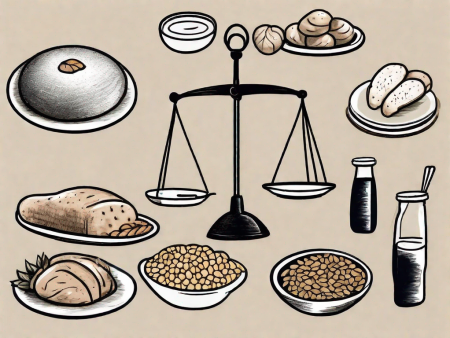Discover the potential benefits of adopting a gluten-free diet for individuals experiencing digestive issues.
Exploring the Benefits of a Gluten-Free Diet for Digestive Issues
Are you tired of feeling bloated and uncomfortable after every meal? Do you find yourself constantly running to the restroom due to unpredictable digestive issues? It’s time to take a closer look at your diet and consider the benefits of a gluten-free approach. In this article, we will delve into the fascinating world of gluten and its impact on our digestive system. Get ready to discover how going gluten-free can revolutionize your gut health and bring sweet relief to those pesky digestive problems!
Understanding Gluten and Digestive Issues
Before we jump into the benefits of a gluten-free diet, let’s first understand what gluten is and how it affects our digestive system. Gluten is a protein found in wheat, barley, and rye. While it may be harmless for most people, individuals with certain digestive issues can find themselves in a gluten-induced battle.

What is gluten and how does it affect the digestive system?
Gluten, oh gluten, how thou torments our tummies! When ingested, gluten can trigger an inflammatory response in the gut for susceptible individuals. This can lead to symptoms like bloating, gas, abdominal pain, and diarrhea. It’s like a party in your stomach that no one wants to be a part of!
Common digestive issues associated with gluten consumption
There are two main culprits when it comes to gluten-related digestive issues: celiac disease and gluten sensitivity. Celiac disease is an autoimmune disorder where gluten wreaks havoc on the small intestine, causing damage and interfering with nutrient absorption. Gluten sensitivity, on the other hand, is a less severe condition where individuals experience similar digestive symptoms but without the intestinal damage.
Now, let’s delve deeper into the world of celiac disease. This condition affects approximately 1% of the population, and it’s not a walk in the park. When someone with celiac disease consumes gluten, their immune system goes into overdrive, attacking the small intestine. This attack damages the villi, tiny finger-like projections that line the small intestine and play a crucial role in nutrient absorption. As a result, individuals with celiac disease may experience malnutrition and deficiencies in essential vitamins and minerals.
Gluten sensitivity, on the other hand, is a bit of a mystery. It’s estimated that around 6% of the population may have this condition, although the exact cause is still unknown. Unlike celiac disease, gluten sensitivity does not cause damage to the small intestine. However, it can still lead to uncomfortable digestive symptoms, making it important for individuals with this condition to avoid gluten-containing foods.
But why does gluten cause such havoc in some people’s digestive systems? Well, it all comes down to genetics. Both celiac disease and gluten sensitivity have a genetic component, meaning that certain individuals are more predisposed to developing these conditions. Researchers are still unraveling the complex interactions between genes, the immune system, and gluten, but it’s clear that genetics play a significant role in determining how our bodies react to this pesky protein.
It’s worth noting that gluten sensitivity is a controversial topic in the medical community. Some experts argue that it may not be directly caused by gluten but rather by other components found in wheat, such as fermentable oligosaccharides, disaccharides, monosaccharides, and polyols (FODMAPs). These FODMAPs can ferment in the gut, leading to bloating and other digestive symptoms. However, more research is needed to fully understand the mechanisms behind gluten sensitivity.
So, whether you have celiac disease, gluten sensitivity, or simply want to explore a gluten-free lifestyle, understanding how gluten affects the digestive system is crucial. By avoiding gluten-containing foods, individuals with these conditions can find relief from their digestive symptoms and improve their overall well-being.
The Link Between Gluten and Digestive Issues
Now that we’ve got a grip on gluten and its effects, let’s dig deeper into the connection between gluten and conditions like celiac disease and gluten sensitivity. Brace yourself – it’s about to get scientific up in here!
Exploring the connection between gluten and conditions like celiac disease and gluten sensitivity
When someone with celiac disease consumes gluten, their immune system goes into attack mode, damaging the lining of the small intestine. This can lead to nutrient deficiencies, fatigue, weight loss, and a whole host of not very fun symptoms. Gluten sensitivity, on the other hand, is less understood but thought to have similar mechanisms at play without the intestinal damage. Fascinating, isn’t it?
How gluten can trigger digestive symptoms in susceptible individuals
Imagine a rogue army invading your gut, causing inflammation and chaos all around. That’s how gluten can make susceptible individuals feel. It sets off an immune response, provoking inflammation in the gastrointestinal tract, and leaving people running for the nearest restroom. No thank you, gluten!
But let’s dive even deeper into the intricate relationship between gluten and digestive issues. Did you know that gluten is a protein found in wheat, barley, and rye? It gives dough its elasticity and helps bread rise. However, for some people, consuming gluten can lead to a range of digestive problems.
One fascinating aspect is the genetic component of celiac disease. Research has shown that individuals with certain genetic markers are more likely to develop this autoimmune disorder when exposed to gluten. These genetic markers are associated with the human leukocyte antigen (HLA) system, which plays a critical role in the immune response.
When gluten enters the digestive system of someone with celiac disease, it triggers an immune response that damages the villi in the small intestine. Villi are tiny finger-like projections that line the intestine and help with nutrient absorption. The damage to the villi can lead to malabsorption of essential nutrients, causing a wide range of symptoms and complications.
Gluten sensitivity, also known as non-celiac gluten sensitivity, is a condition that shares some similarities with celiac disease but lacks the characteristic intestinal damage. The exact mechanisms behind gluten sensitivity are still not fully understood, but it is believed to involve an immune response triggered by gluten consumption.
Interestingly, gluten sensitivity can manifest with a variety of symptoms beyond just digestive issues. Some individuals may experience headaches, brain fog, joint pain, skin problems, or even mood disturbances after consuming gluten. These symptoms can be debilitating and significantly impact a person’s quality of life.
Researchers are actively studying the link between gluten and digestive issues to better understand the underlying mechanisms and develop effective treatments. One area of focus is the role of intestinal permeability, also known as “leaky gut,” in gluten-related disorders. It is hypothesized that gluten may contribute to increased intestinal permeability, allowing harmful substances to leak into the bloodstream and trigger immune responses.
Moreover, recent studies have also explored the potential involvement of gut microbiota in gluten-related conditions. The gut microbiota refers to the community of microorganisms residing in our digestive tract. Imbalances in the gut microbiota have been implicated in various health conditions, including digestive disorders. Some researchers believe that alterations in the gut microbiota composition may play a role in the development of gluten-related disorders.
As the understanding of gluten and its impact on digestive health continues to evolve, it is becoming increasingly clear that gluten can have far-reaching effects beyond celiac disease. The intricate interplay between gluten, genetics, immune responses, and gut health highlights the complexity of these conditions and the need for further research.
Benefits of a Gluten-Free Diet for Digestive Health
Now for the exciting part! Let’s talk about the wonderful benefits of adopting a gluten-free diet if you’re grappling with digestive issues.
But before we dive into the details, let’s take a moment to understand what gluten is. Gluten is a protein found in wheat, barley, and rye. For some individuals, consuming gluten can trigger a range of digestive symptoms, leading to discomfort and decreased quality of life.

Relief from digestive symptoms through gluten elimination
Out with the old, in with the new! By ditching gluten, you can bid adieu to those pesky digestive symptoms that have been holding you back. Bloating? See ya! Abdominal pain? Not welcome anymore! By eliminating gluten from your diet, you’ll be amazed at how quickly your gut will shout with joy.
Imagine waking up in the morning without that constant feeling of discomfort. No more worrying about rushing to the bathroom or feeling bloated after every meal. With a gluten-free diet, you can finally experience relief from these troublesome symptoms and regain control over your digestive health.
But it’s not just about symptom relief. By eliminating gluten, you are also giving your body a chance to heal from any damage caused by gluten consumption. Over time, this can lead to a significant improvement in your overall digestive health.
Improvements in gut health and digestion on a gluten-free diet
It’s time to give your gut some much-needed TLC. By going gluten-free, you are providing your digestive system with a chance to heal and recover. Say goodbye to inflammation and hello to boosted digestion! Your gut will thank you by working more efficiently, leaving you feeling lighter and happier.
When you consume gluten, it can trigger an inflammatory response in your gut, leading to irritation and discomfort. By removing gluten from your diet, you are reducing the burden on your digestive system, allowing it to function optimally.
Not only does a gluten-free diet reduce inflammation, but it also promotes the growth of beneficial gut bacteria. These friendly bacteria play a crucial role in maintaining a healthy gut environment and aiding in digestion. By nourishing these bacteria with a gluten-free diet, you are supporting a flourishing gut microbiome.
Improved digestion means better nutrient absorption. When your gut is functioning at its best, it can effectively break down and absorb the nutrients from the food you eat. This means you’ll be getting the most out of your meals, leading to increased energy levels and overall well-being.
So, if you’ve been struggling with digestive issues and are looking for a natural way to improve your gut health, a gluten-free diet might be just what you need. Give it a try and experience the transformative benefits for yourself!
Gluten-Free Diet and Inflammation
We’ve covered the basics, now let’s dive into the nitty-gritty of how a gluten-free diet can help with inflammation in the gut.
The role of gluten in promoting inflammation in the digestive system
Picture gluten as a little fire starter, sparking inflammation in your gut. It has been shown to increase gut permeability, allowing nasty substances to pass through and ignite an inflammatory response. It’s time to put out that fire!
How a gluten-free diet can help reduce inflammation and promote healing
Going gluten-free is like pouring a bucket of water on that gut inflammation fire. By removing gluten from your diet, you’re providing your body with a chance to heal and calm down the inflammation. Say goodbye to those fiery gut flares and hello to a happy, peaceful digestive system.
Gluten-Free Diet and Nutritional Considerations
Before you jump headfirst into the gluten-free world, let’s talk about some nutritional considerations. Because hey, healthy eating is not just about going gluten-free!
Potential nutrient deficiencies associated with a gluten-free diet
While a gluten-free diet is fantastic for some, it’s essential to be mindful of potential nutrient deficiencies. Without proper planning, gluten-free eaters can miss out on key nutrients like iron, calcium, fiber, and B-vitamins. But fear not! With a little extra attention and careful food choices, you can maintain a balanced and nutritious gluten-free lifestyle.
Strategies for maintaining a balanced and nutritious gluten-free diet
Being gluten-free doesn’t mean settling for bland and boring meals. Get creative in the kitchen! Explore the plethora of naturally gluten-free foods like fruits, vegetables, lean meats, and whole grains like quinoa and rice. And don’t forget about the wonderful world of gluten-free alternatives like almond flour, coconut flour, and even cauliflower pizza crust. Your taste buds will thank you!
In conclusion, a gluten-free diet can be a game-changer for individuals struggling with digestive issues. By eliminating gluten, you can bid farewell to uncomfortable symptoms, improve gut health, and reduce inflammation. Just remember to pay attention to your nutritional needs and get creative in the kitchen. So go forth, my gluten-free friend, and embrace the wondrous benefits of a gut-friendly life!







